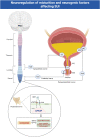Advances in the molecular pathogenesis and cell therapy of stress urinary incontinence
- PMID: 36846586
- PMCID: PMC9944745
- DOI: 10.3389/fcell.2023.1090386
Advances in the molecular pathogenesis and cell therapy of stress urinary incontinence
Abstract
Stress urinary incontinence (SUI) is very common in women. It affects patients' mental and physical health, and imposed huge socioeconomic pressure. The therapeutic effect of conservative treatment is limited, and depends heavily on patient persistence and compliance. Surgical treatment often brings procedure-related adverse complications and higher costs for patients. Therefore, it is necessary to better understand the potential molecular mechanisms underlying stress urinary incontinence and develop new treatment methods. Although some progress has been made in the basic research in recent years, the specific molecular pathogenic mechanisms of SUI are still unclear. Here, we reviewed the published studies on the molecular mechanisms associated with nerves, urethral muscles, periurethral connective tissue and hormones in the pathogenesis of SUI. In addition, we provide an update on the recent progresses in research on the use of cell therapy for treating SUI, including research on stem cells therapy, exosome differentiation and gene regulation.
Keywords: exosome differentiation; gene regulation; molecular pathogenesis; stem cell therapy; stress urinary incontinence.
Copyright © 2023 Wang, Zhang and Lu.
Conflict of interest statement
The authors declare that the research was conducted in the absence of any commercial or financial relationships that could be construed as a potential conflict of interest.
Figures




References
-
- Anderson K. E. (1993). Pharmacology of lower urinary tract smooth muscles and penile erectile tissues. Pharmacol. Rev. 45, 253–308. - PubMed
Publication types
LinkOut - more resources
Full Text Sources

